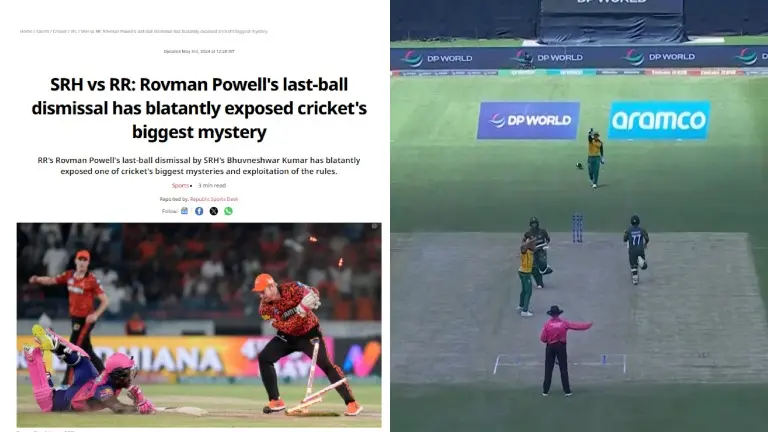Updated 11 June 2024 at 13:43 IST
BAN vs SA: We EXPOSED cricket's biggest loophole in May, then it cost Bangladesh in T20 WC in June
Before the instance happened at the BAN vs SA T20 World Cup match, we figured out the enigmatic dead-ball loophole back in May during the IPL 2024 season.
- SportFit
- 3 min read

The game of cricket is an exciting part of several people's lives, it's no secret that the sport has a set of its own rules that every player needs to follow. But there are some instances where certain cricketers and teams are seen exploiting the rules of the game. The latest T20 match between Bangladesh and South Africa saw such a moment when the Proteas defeated the Bangla Tigers by a four-run margin, something which Bangladesh would feel hard done by due to certain regulations. We had reported a similar instance during the IPL 2024 season when a team made full-blown use of the dead-ball advantage, and the moment has emerged as a turnaround at the ongoing ICC Men's T20 World Cup 2024.
Also Read: Bangladesh fall prey to major ICC loophole as SA defeat them, what's the dead ball rule controversy?
It went around and came around! Republic World's expose over the dead-ball rule in IPL 2024 now haunts Bangladesh cricket fans
The umpire's action of giving an LBW to Mahmudullah during the BAN vs SA match was indeed a massive blunder, and while it was changed, South Africa was able to make appropriate use of the sly tactic. Republic World reported a similar instance which took place in May when the IPL 2024 season was in full swing.
In a last-ball thriller, SRH's Bhuvneshwar Kumar trapped Rovman Powell as the Windies batter ended up playing all around the ball and hit the pads after Bhuvneshwar served a full toss. The ball reversed into the right-hander a little, and the on-field umpire reacted to the bowling side's appeal since it appeared sufficiently straight, and his finger went straight up to indicate a wicket. Powell went for a DRS, and the ball tracking deemed that the ball was in line and hitting the wickets. SRH stole the win by one run. But in case the scenario ended up reversing and the decision was not out, would the game be headed for a super over as Powell completed a single? However, that is not the case, as SRH would still have the edge against RR.
Advertisement
BAN vs SA: What is the dead ball rule that cost Bangladesh?
As per Appendix D of the official cricket laws by ICC, As soon as the umpire deems that the batter has lost his wicket, the ball is deemed dead.
Advertisement
"If following a Player Review request, an original decision of 'Out' is changed to 'Not Out', then the ball is still deemed to have become dead when the original decision was made. The batting side, while benefiting from the reversal of the dismissal, shall not benefit from any runs that may subsequently have accrued from the delivery had the on-field umpire originally," as per the laws.
The same thing happened at the Bangladesh vs South Africa T20 World Cup clash when Mahmudullah's ball hit the pads and sailed for the boundary ropes, and despite the fact that he was determined not out by the DRS, they were not awarded the four runs due to the dead-ball rule. And Bangladesh eventually lost the match by four runs.
Whether with or without purpose, in both instances, the teams have attempted to gain advantages by exploiting the official rules, and both times, the teams have succeeded.
Published By : Pavitra Shome
Published On: 11 June 2024 at 13:31 IST
